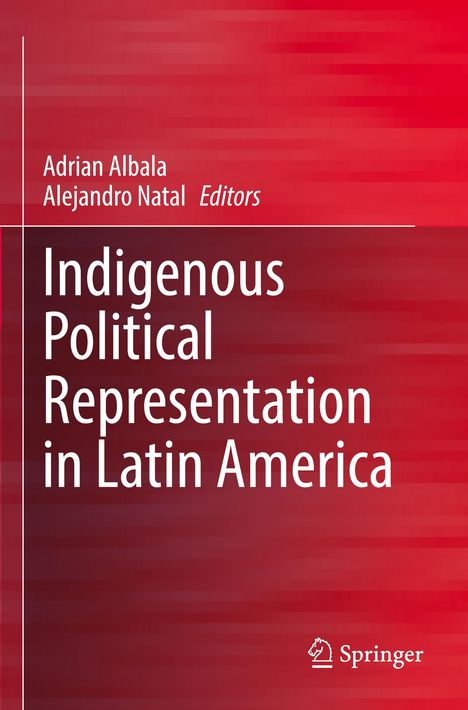Indigenous Political Representation in Latin America, Kartoniert / Broschiert
Indigenous Political Representation in Latin America
(soweit verfügbar beim Lieferanten)
- Herausgeber:
- Alejandro Natal, Adrian Albala
- Verlag:
- Springer International Publishing, 07/2024
- Einband:
- Kartoniert / Broschiert, Paperback
- Sprache:
- Englisch
- ISBN-13:
- 9783031339165
- Artikelnummer:
- 11924248
- Umfang:
- 268 Seiten
- Nummer der Auflage:
- 2023
- Ausgabe:
- 2023
- Gewicht:
- 411 g
- Maße:
- 235 x 155 mm
- Stärke:
- 15 mm
- Erscheinungstermin:
- 21.7.2024
- Hinweis
-
Achtung: Artikel ist nicht in deutscher Sprache!
Weitere Ausgaben von Indigenous Political Representation in Latin America |
Preis |
|---|
Klappentext
This book presents a comparative analysis of the struggles of Latin American indigenous peoples for effective representation in national political systems in the region. Through a detailed exploration of the political dynamics of indigenous groups and examples of mechanisms of political representation, the studies in this book reveal how power relations, cleavages and indigenous civil society organizations are essential to our understanding of indigenous political participation. These studies closely inspect how collective action builds up at local level in grassroots organizations, and how it then articulates or not with larger mechanisms of regional and national political representation, providing a more comprehensive and comparative assessment of why and when representation works and fails for indigenous people.
This contributed volume is organized around one general and comparative chapter on indigenous political representation in Latin America followed by eight case studies, divided into three main groups. The first group includes cases with a more inclusive political environment, such as Bolivia, Ecuador and Guatemala. The second group brings together cases with certain representation and / or active indigenous elites: Colombia, Mexico, and Paraguay. Tthe third group presents outlier cases with potential indigenous issues: Peru and Chile. Finally, the last chapter brings together reflections on how mechanisms for effective political representation can be improved and how indigenous organizations can be fostered to ensure effective political representation.
Indigenous Political Representation in Latin America will be of interest to political scientists, sociologists and anthropologists studying both indigenous collective action and political representation by presenting a discussion on how to structure representation mechanisms capable of politically integrate the ethnic diversity of Latin American countries in order to build a multicultural citizenship. It will also help policy makers and activists by discussing the successes and failures of effective indigenous political representation in Latin America.


